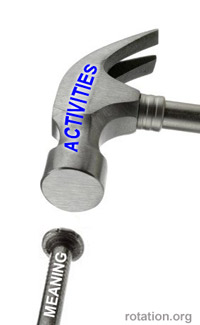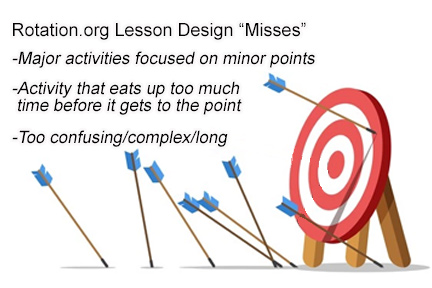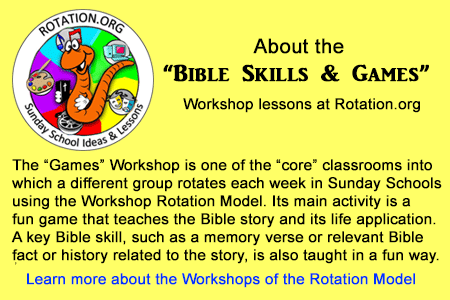A Bible Skills and Games Workshop Manual
V1.2
Written by Neil MacQueen using many of the wonderful suggestions contributed at Rotation.org over the years!
I sincerely hope other folks will add to this "provisional manual" by posting their thoughts and ideas. You have my permission to copy and modify the following for local church use.
What is the "Bible Skills and Games" Workshop?
The Bible Skills and Games Workshop is one of the "core" workshops of the Workshop Rotation Model. Other "core" workshops include: art, a-v, and drama. In addition, many churches add a computer, music, puppets, science, or storytelling workshop to round out their four to five week "rotation" of their grade grouops through their workshops per a story.
In the Rotation Model, we teach one Bible story several weeks in a row. Each week the kids rotate to a different "workshop" which teaches the story through a specific type of learning activity, such as, art, games, computer, a-v, or drama. The teachers do not rotate. Instead, we match their teaching strength to a workshop and have them staff it for the four to five "rotation." View several short presentations about how and why we rotate and schedule.
With regard to the “Bible Skills and Games” Workshop, we look for teachers who are comfortable with Bible skills and tools, and know the value of games.
The original concept behind the Bible Skills and Game Workshop was to create a classroom where Bible tools were used, basic Bible skills and knowledge were taught and emphasized (beyond the emphasis they might receive in other workshops), and where some memorization took place –all within a fun gamey format.
The problem we were trying to solve was TEACHERS who would SKIP GAMES in the lesson plans because they weren't gamey teachers, and curriculum that didn't have very many games or good ones. We also found that some teachers didn't know or weren't comfortable teaching certain things like a memory verse (which in a lesson like Psalm 23, for example, is a goal!).
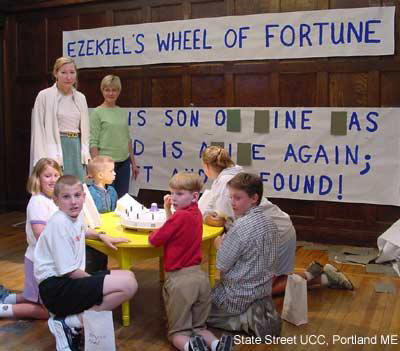
As you will read, the games in the workshop are not limited to what you do “after” the Bible study, rather, the games can also be used to engage students DURING the Bible Study. Search, find, complete, point, put in order -- all our gamey teaching tricks find a home in the Bible Skills and Games Workshop -- which is why you want to recruit a teacher who LIKES to teach that way.
"Bible Skills" is a Broad Subject
It can mean different things to different people, lessons, and churches, as well as different age groups. The POINT of the Bible Skills and Games Workshop is to make sure what you decide is important IS NOT MISSED as was so often the case in many traditionally taught lessons with teachers who either didn't or couldn't teach important skills.
Bible navigation, structure, history, “who’s who”, geography, culture, key verses, a key memory verse, --these are some of the "Bible Skills" you can teach alongside the skill of being about to retell the Bible story itself and understand (interpret) what it teaches us about God and our lives.
What constitutes a "Bible Skill" varies per Bible story too!
- Teaching Psalm 23, you'll want to do some memory work in this workshop, and talk about what the Psalms are.
- If teaching about the Feeding of the 5000, you may want to investigate the interesting fact that it's found in all four Gospels and look at how each tells the story a bit differently!
- If teaching from the Book of Acts or stories of Daniel, you'll probably want to break out the maps.
- If teaching about the Exodus story, you might want to break out the Bible timeline.
Some churches "make lists of skills" they want to make sure kids know by a certain age. Among Rotation Modelers, we tend to decide which stories are best to teach and then identify what skill THAT STORY can help us learn and put it in the Bible Games Workshop or another.
The Game Workshop can also be the designated place where “other church skills” get taught that don't necessarily arise from the Bible story being taught. For example, in some churches, they may use several minutes of each Games Workshop to teach a “kids’ catechism” or the Lord's Prayer to a certain age group.
Some Bible skills can intentionally fit in other workshops too. For example, the Bible Computer Workshop was originally created to teach some basic Bible knowledge through memory games and quizzes --which the kids love to do on a computer.
 The point is this:
The point is this:
Creating a "Bible Skills" and Games Workshop, gives you a great tool to make sure whatever "skill" is on your list is actually being taught somewhere in your program![]() and not left up to individual teachers.
and not left up to individual teachers.
A Commercial for Rotaton.org's Writing Team Lesson Sets:
The Team's lesson sets almost always include an exemplary and creative Bible Skills and Games Workshop lesson plans!
These are in addition to all the great ideas found in our public forums.
Our Writing Team often innovates new game ideas and refreshes old one, and their approaches can be RE-USED for many other stories. Just browsing their Game Workshop ideas will expand yours.
Take a look at the WT's Main Lesson Menu. Everyone can read the Team's summary of lessons, including a description of their Bible Games Workshop. Only Supporting Members can get the actual lesson plan (because they make this site possible. Join Today!)
What's in a Name?
Reclaiming the "Game" Workshop's Concept
The original name of the "Game" Workshop was “The Bible Skills and Games” Workshop. Somewhere along the line many of us shortened it to "The Game Workshop," and after reading hundreds of "Game" Workshop lessons that lack a Bible Skills focus, I am campaigning to restore the original name to this workshop with the hope that it will restore one of its original reasons for being.
Having said that in the paragraphs above, I want to now turn restoring the idea of TEACHING GAMES to the Games Workshop!
You might think that's a strange campaign, but after reading a lot of other people's "Game Lessons," I can tell you that many people think the game is what you do when you're done with the lesson. ![]()
What some people and publishers call a "game" also needs addressed. Especially for the sellers of paper, they think a Bible game is what you do with a pencil on their worksheet. Word Searches are not a main activity. ![]()
I also want to address another major failing of many Bible Games I see in lessons: games that don't teach the main point of the story or its life application. Instead, teachers and publishers use games as "boredom breakers" after the "real" lesson has been talked.... er, I mean "taught." You can spot "games being used as boredom breakers" because they rarely have anything to do with the MAIN POINT of the lesson.
In our vision of the Bible Skills and Games Workshop, we strive to craft games to be ON POINT. This is a goal that our Writing Team regularly strives for. Here are two graphics from our Writing Team writer training documents that speak to the right way to use games in a lesson plan.
This isn't to say, however, that games only happen once in the lesson! Ideally in the Games Workshop, you will use games or "game-y" interactions throughout the lesson, including the opening to peak their interest, to help read the scripture, to promote discussion, to think about life application, and even in the closing. This idea comes from the Rotation Model itself where we try and use each workshop's creative teaching method THROUGHOUT the lesson, and not just in one part of it.
This photo of kids and their teacher from my church shows them using a tilting "maze game" for studying about Paul is a good example of a gamey activity that is both "on point" and promotes discussion and reflection while we're playing with it.
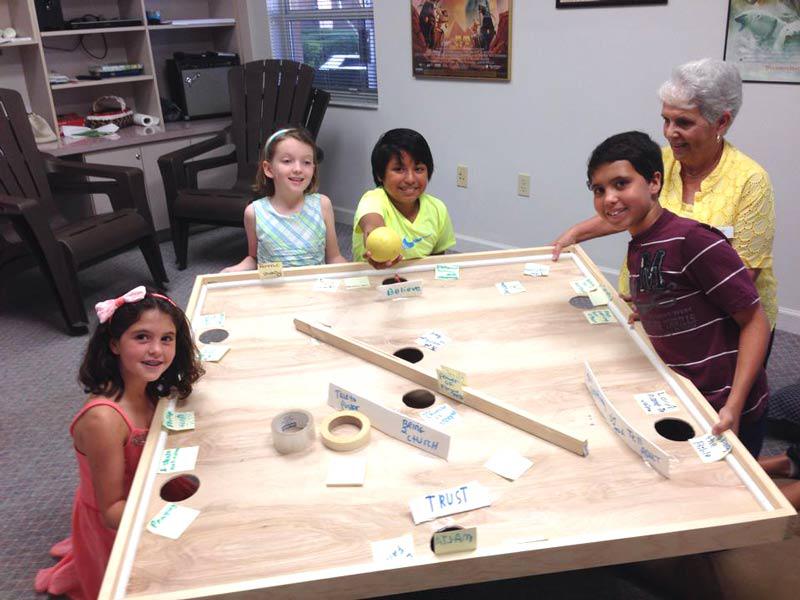
In this particular gameboard, the subject was Paul's Conversion. The kids helped construct the gameboard to illustrate "what helps and what hinders a person from believing?"
Kids added rails ('helps') and labeling pitfalls and other hinderances per the teacher's suggestion. Then they tried to navigate the ball around the table. The teacher then made comments about helps and hinderances, and asked the kids to add more (based on their responses) which they gladly did and played again. They played it many times, and each time, new talking points were illustrated.
We've since used this board and basic idea of cooperative gaming for many other stories and games, such as, "get the ball in the correct next phrase from Psalm 23" and "correct order of the Ten Commandments."
We also relabeled it for a "Coming to Church with a Good Attitude" and "Avoiding Feeling Rushed/Bad Attitude."
Below, you'll see examples of how to put the Skills & Games back in the forefront of the Bible Skills and Games Workshop! But first, a word about the Bible Skills and Games Workshop ENVIRONMENT...
Putting the Game Tools Front and Center
A proper Bible Skills and Games Workshop should have the Bible tools and reference materials on full display, and not stuck in a closet. This is the workshop where traditional Bible Study tools and aids are AT HAND and get USED in the lesson (often through the guise of a game, such as, "find the verse," or "draw a word out of the hat and look it up.").
Resources include: maps, pictures, timelines, concordances, Bible dictionaries, Thesauruses, and good cross-reference Bibles with study notes.
When not in use, things like maps and timelines should be hung on the walls for the wandering eye to soak up. No Bible mural, however beautifully painted, can teach as much as a set of maps, story pictures, timelines and posters. Many "Game" Workshops sprout inspired decorative environments, such as, tents and Temple or synagogue murals, which also inspired the workshop's renaming. In some cases, however, those environments also shoved aside the original idea of putting all our tools OUT WHERE TEACHERS AND STUDENTS COULD SEE THEM & USE THEM. Many students are naturally curious, and most are stimulated by the anticipation created by "stuff" in front of them when them come in. Don't be afraid to have a "pile of anticipation" on your table and on your walls.
- If your study tools are out of sight in the classroom, they will be out of mind.
- If your lesson plan and games don't provide a game-y activity that specifies use of the Bible study tools, then the tools will gather dust.
- If you put a volunteer in this workshop who isn't comfortable using Bible study tools, then change the volunteer.
Traditional curriculums often supplied these teaching aids as part of the curriculum package, and many churches have them stuffed in filing cabinets. They can also be ordered online from various Christian suppliers and denominational sources.
It’s easier to send a signal to teachers about the methods you want to them to employ in an art workshop or computer lab, but not so easy in a Bible Skills and Games Workshop that is devoid of visible content, study tools, and game props.
Your Bible Skills and Game Workshop should have READY discussion tools like, "discussion cubes" and "spinning wheel" and game buzzers. Every part of your lesson, even your opening questions, and deciding who has to answer a question can be "gamed."
A Typical Bible Skills and Game Workshop Lesson Outline
1. Introductions
2. Question for the Day (What you want the kids to remember the most)
3. Bible Study
4. Digging Deeper into the Story
5. The “Big Game”
6. Reflection
PLEASE NOTE: Every single step in this lesson outline is a place you can play a game! 
Sometimes I call these "game-y' techniques or "mini-games", as they are not full-blown games. Rather, your study is punctuated by fun 'game-y' ways of getting participation. Below are some examples. Write out your "game-y techniques" in your lesson plan for your teachers.
Here is the above outline with game-y examples added at every step:
To "old-timers", the following techniques may seem obvious, but many volunteers may be unfamiliar with them, or didn't realize they were supposed to employ them.
1. Introductions
Play a quick 'getting to know you better' game. Example: As they arrive, write down middle names on cards and have students to match the names to the student.
2. Question for the Day
(What you want the kids to remember the most) Ask: "Based on the posted scripture passage, which of the following three questions on the board do you think is our Question of the Day?" (the kids can look up the passage to answer)
3. Bible Study
I usually open with an 'overview' that emphasizes Bible skills. Examples: Find 1st Kings 19. Then I make assignments to different students, such as, "tell me four other people found in this book." "What stories come before and after." "Name two major characters in the book preceding and after." Then I might pull a timeline off the wall that we have been working on, and have everyone guess where this story takes place on the Bible timeline. Then I might say, "As we read this passage, hit your buzzer when you think we’ve gotten to the key idea in the passage, and there may be several." See my tips on "how to have students help read the passage" below.
4. Digging Deeper into the Story
Say: As we read, "let’s vote using our buzzers what we think the most important verse is, the strangest (etc). (See my suggestion for doing this with spoons too). With certain passages, I might toss out a couple of THESAURUSES and have the kid look up alternative words for strange Bible words like "commandment" or "salvation". Then we try them in the passage and vote them up or down Synonyms are a great way to unlock meanings. Then i might say "Here are three possible Life Applications I’ve written out in the corners of our room, go to the one you think is the strongest for you."
5. The “Big Game” Relay Game
6. Reflection Graffiti Wall responses
You'll want your workshop to have lots of game props available:
Wheels of Fortune
Discussion Cubes
Answer Buzzers
A Big hat you can fill with discussion questions to pass around
Baskets you can toss things into
Carpet squares for instant floor gameboards.
Jeopardy question wall pockets
Hot Potato for "who gets to read and discussion..."
Beachballs and Boxes you can put questions or numbers on (and toss or roll)
I love the trainerswarehouse.com website because it has lots of these gamey gadgets.
A Few Techniques:
Sunday School has a long tradition of creative discussion techniques. Here are just a few. More resources are posted below. Aside: Many long-time teachers have a deep bag of similar 'tricks'. But many of our adult teachers were taught by monolog-specialist. Bible Skills and Game Workshop lesson plans should SPECIFIY THE "GAME-Y" STUDY TECHNIQUE.
Technique 1: Turn your Key Question into a Mini-Game:
As you are studying Abraham's Call, turn your discussion question about "who has been called by God in the Bible to do something difficult" into a mini-game by quickly inviting student pairs to list as many people in the Bible they remember who were called by God to do something difficult.
Or, simply write out several questions and ask student to guess which question the teacher thinks is the “Question of the Day”. Give them the Bible verse so they can look it up and make a good guess.
Or, using a variation of "the name game", go around the circle and have each student name a name --after they have repeated the names in order that everyone else has spoken (the list of names getting longer as you get around the circle). In a small group, challenge them to come up with “7 names”, rather than simply seeing how many they can come up with. If they come up 6, they’ll strain to come up with 7, and that is challenging them…ie… a game.
Technique 2: Turn their reading into a Mini-Game:
Pass out cards and pencils and have them silently read a passage and write down what they think are the 3 most important keywords in the passage, and the 2 they don’t know. Then have everyone share their keywords/don’t knows” while you list them on the board, and see how many of their “keywords/don’t knows” matched those of the class. This becomes your golden opportunity to expound.
Or, give them “easy” buttons or buzzers, or a stuffed animal to throw at a target when they think we’ve just read the “key verse of the entire passage”, or found “the strangest verse in the passage”. Sometimes you have to go through the passage twice so they have figured out when they’re going to throw the monkey or hit the buzzer. I’ve also played this like a game of spoons…putting one less spoon on the table than there are kids. When any student reaches what they think is the key verse, everyone grabs for spoons (it’s wild), but then the spoon-reacher has to explain their answer and the spoons go back on the table. You can change the “reasons” to grab a spoon to suit your study.
Technique 3: Assemble the Scripture/Timeline/Storyline
Some stories and verses lend themselves to being reassembled. A simple large puzzle on the table, or magnet sheets on the steel chalkboard turn it into a puzzle game. The nice thing about “pieces” is that you can then toss these pieces to individual students and say “tell us what this part is, what does this part mean?” or “tell us more about this person”, …then send them into their Bibles again.
Technique 4: Give them a "What?" Button to buzz into your study.
Get a couple "easy" buttons from Staples (or buzzer buttons off the web). Invite students to hit the buzzer for various reasons you have posted on the board, such as, “3 buzzes = this seems like a key idea to me!” “2 buzzes = this is a weird verse, I don’t get it” “1 buzz = anytime God’s name is mentioned”. This "making a game out of it" helps them get over their shyness. It also gives the teacher a button to press when THEY don't understand and want to ask the kids a question. The buzzer creates a fun sense of anticipation, and makes them listen/read more carefully to know when to use the buzzer.
There are dozens of variations on these three techniques, and many more ways of "gaming" the reading, digging and discussion. When writing your “Game” Workshop lesson, look at each of the five lesson steps and put a game in each step.
Technique 5: The Importance of Stuffed Monkeys (and other props)
Whether you’re reading, storytelling, or leading discussion, PROPS help focus student attention and make learning fun and feel “gamey”. I routinely bring props related to the story to tell the story, passing it around to different readers. A basket of action figures can become characters in the story. For several years we had a "He-Man" figurine as Jesus and I still smile when I think about it.
One of my favorite Bible study props was a stuffed monkey we threw to the kids who then had to answer a question. (Now you know where the idea for my Bongo Loves the Bible CD came from). At times we even turned it into a "dodging" game of “whoever the teacher hit with the stuffed monkey had to answer the question up on the board”. Funny thing was suddenly kids wanted to answer questions or be the one who looked up a word in the Bible Dictionary, or was “tagged” to come up to the map. The name of that game is “have fun.”
Technique 6: Question Cubes/Boxes/Dice/Beachball
Decorate two 6 inch boxes and tape discussion starters to the sides of one, and numbers on the other box. The kids roll one across the table to get the question, and roll the other to see which of them has to answer, or how many kids have to answer it. Dice1: "If I were God in this story, I would...". Dice2: #1 has to answer, or "all girls" etc. Sometimes the questions were simply paperslips in a bag the kids drew. In one variation, I added 2 slips for 2 characters the kids who drew those slips had to "pose like" while the story was being read. After the reading, the class would vote on the "best story poser" and we'd given them a goofy medal.
This is the GAMES workshop, remember? So one of the things it requires of your teachers is a SENSE OF HUMOR.
The Point of these "Techniques":
EXPECTATION + ANTICIPATION + FUN = FOCUSED MINDS and BETTER RETENTION.
A little bit more about "Game Theory"...
Games increase blood flow and adrenaline…which are aids to memory and thinking skills. Games also have practical functions. They break up the tendency for a teacher to monopolize the conversation. Games are goal-oriented (to play, to win) which provides a sense of structure and direction to students, a sense of completion, and encourages timely participation, rather than sitting back. They also foster group cohesiveness.
When gaming, it is important that the teacher not be punitive, or do anything to discourage student participation. Good gamers dole out plenty of mulligans and create a sense of fair play. Great game leaders make their games fun and humorous, so that everyone feels like a winner just because they played!
Games by nature involve some sort of competition or skill. This is necessary to raise the brain's interest and for memory formation. The key to allowing competition without suffering from its ill effects, is to also adjust the rules and games to make it competitive for everyone and the outcome positive for everyone, rather than just a few. Often, this requires making fun changes and rules on the fly. Once you get your students used to this "everyone wins when they learn and have fun" your competition will simply function to sharpen their focus and create better memories.
Game Construction Guidelines:
1. The game should be as closely themed to the lesson as possible.
2. The game activity should mimic action in the story if possible.
3. The game should require use of content to play.
Here’s a Jonah Relay Game that demonstrates all three of the above game construction principles.
After my mini-gamey study, I’m going to have the kids play the Jonah Relay Game: They will run to Joppa, row across the floor on a piece of cardboard, crawl through a whale belly (two sheets of clear plastic), and build a small hut (blanket over a frame) and lower a green stalk to the floor (plant eaten by worm), shake their fist at God, and then try to remember what God said to Jonah about the plant dieing. The Ref will decide if they can then crawl humbly away to the finish line.
At each station is a card that has quotes Jonah must read. Mix up the cards so the kids aren’t always reading the same thing at each station.
After playing, we’ll do it a second time for speed, and I’ll add one more station: At the ending, you must find the story of Jonah in the Bible and show it to the referee!
I’ll also often LABEL the stations of the game with ideas from the story. Thus, the whale has a sign saying “God wants your attention”, and the Plant has a sign saying, “God forgives, why don’t you?” If we have time, I’ll have the kids come up with the “what does this mean” and write it on a strip of poster board. Kids enjoy helping you set up the game field. Make the most of every opportunity to connect content, vocab and concepts to visuals and actions.
If I'm doing a "Jeopardy" our big boardgame game about Jonah, I'll still try to THEME the decor of the game, try to link actions and objects in the game with items/actions in the story, and try and tie as much learning content to the game as possible, even beyond quiz questions. Thus, I might name the teams in a quizbowl: "Team Nineveh and Team Joppa", and keep score by making the team's plant get eaten by a worm (made out of cardboard). These are not window-dressings! They are memory building blocks. Even something as small as a quiz prop based on something from the story helps EMBED the memory.
Relay Game Stations Tips
Your relay game stations can be based on a place in the story, a character, an attitude, a verse in the story, or a meaning of the story. Thus, a relay for the Prodigal Son can include “the Pig sty” station, and “the Older Brother’s unforgiving jealousy” darkness. Your Game Workshop “Game Kit” should have things like: plastic sheets, costumes to put on, canvas dropcloths, rope, cardboard, blankets, packing tape, posterboard,
A Note about “Reflecting and Reflection” in the Game Workshop
Sometimes it’s hard to get the kids to reflect at the end of a big active game. Journaling, for example, or leading a prayer can be tough to do after 10 minutes of running around. Their adrenaline is going, and thus, you need a reflection that can handle it.
This is why you want to "reflect" (emphasize life application, what it means to me) DURING THE GAMES, rather than wait til their end. And as you will see in many lessons here at Rotation.org, reflection/life application can ALSO be taught using games and gaming techniques.
One activity I have had success with is creating a “graffiti wall” they could stand and write at after or as part of a game's final activity or station. This grafitti wall can have "fill in the blank" question they respond to, "I will..." statements, and even leave room for art, such as, "draw yourself as one of the Ps 23 sheep at the end of the psalm."
I should also mention that Reflection isn't just for the END of the lessson. Rather, you can reflect as you study.
More About Bible Study Tools for the Bible Skills and Games Workshop
In addition to good study Bibles, story pictures, and concordances, you'll also want a Dictionary of Bible Pronunciations handy, a couple of THESAURUSES to find synonyms for Bible words, posters and maps of Israel, posters displayed showing books of the Bible and timeline, ...and a couple of creative Bible and game books for the teacher. Some Bible Skills and Games Workshop have the kids create and add-to a timeline during the year.
You'll also want to have things like cards and markers, bags to draw names/questions out of, flipcharts, lots of drawing space on the wall, and some fun costumes and hats to toss to various readers/characters.
Overhead projectors and videos can be used in the Bible Skills and Games Workshop, and some also have a computer to project Bible software, Bible atlases, and view photos or other related content found online. Let your rotation's Book, Chapter and Verse inform what tools might be most appropriate.
GAME RESOURCES
In addition to the hundreds of game ideas found in our Bible story lesson forums under "Game Workshop," there are many “creative Bible study” books on the market, and probably in your church library. In my experience, I rarely use the ideas from these book "as written", instead, ADAPTING them for my lessons.
Your church youth group or children’s ministry probably has several “books of Games” or “101 Creative Bible lesson”. These are an endless source of Game Workshop inspirations ---with every game a potential candidate to ADAPT to your story/meaning with a little bit of creativity and re-theming.
If you have a favorite resource, post it here in the Game Workshop Design forum at rotation.org.
This "manual" is a work in progress. I welcome your suggestions and additions.
<>< Neil MacQueen
How to find Bible games at our site
Go to our Lesson Forums to look up your story and find our Bible Games for it.

